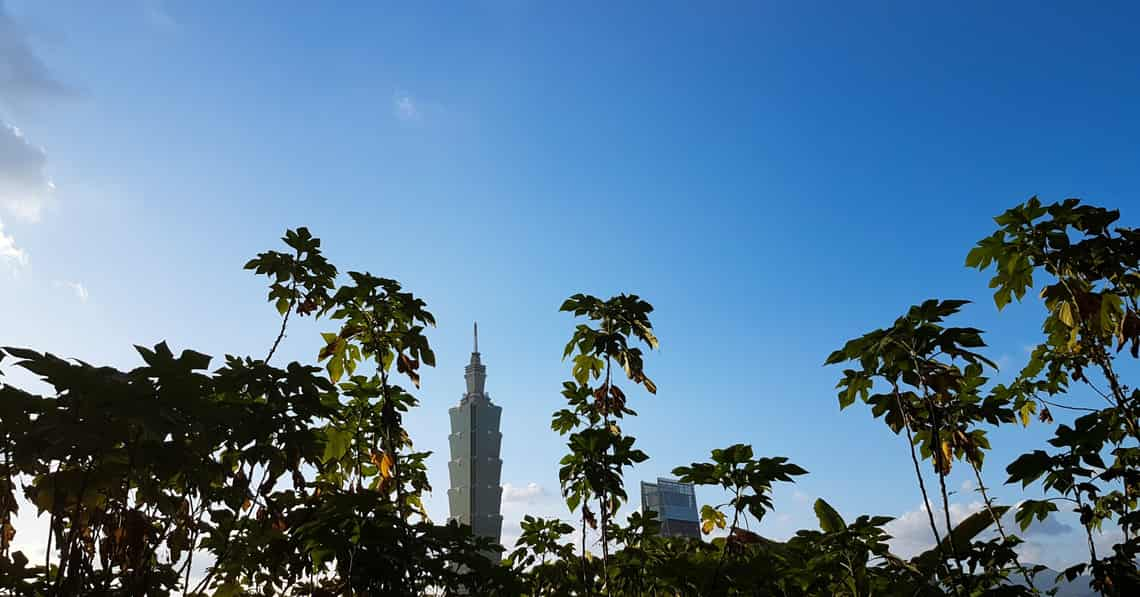“Is Taiwan a country?” I was asked by my fellow traveller while we were boarding the plane. “Yeah, I think so,” I said tentatively, managing to confirm by Google a little later while waiting for takeoff. Four hours later, we taxied onto Taoyuan International Airport where water trucks sprayed water in arcs over our plane. Initially I thought the water salute was a warm welcome to the Thai press and bloggers, but it turns out it’s a sort of airport tradition for new operating flights — ours being AirAsia’s inaugural flight from Chiang Mai to Taipei.
It was all quite easy to get oriented at the airport and while I hadn’t travelled abroad for a few years and this was my first trip to Taiwan, I managed to quickly exchange NT$ 3,000 at the airport (about the same amount in Thai baht, which lasted me for the entire four days, since all of our travel, accommodation and meals were covered by the organisers), get a cheap NT$ 300 sim card and off we went.
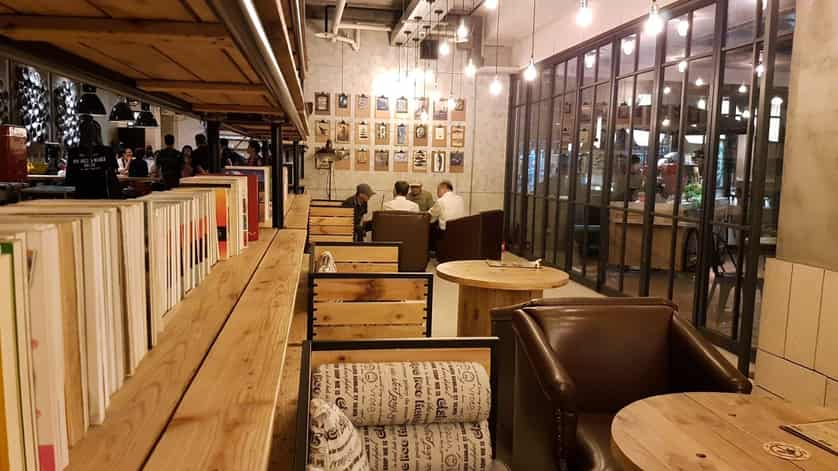
We checked into the charming vintage Hotel PaPa Whale where I, with all my adrenalin rush, fell in love at first sight with its retro vibes. Dumping our bags, we didn’t waste any time and headed out to explore the Ximending neighbourhood.
If it weren’t for the noticeably clean streets lined with signs in Chinese, I wouldn’t have felt as though I was in a foreign country; the weather was similar to Chiang Mai and I felt right at home. “This neighbourhood is popular with young people,” said James, our Taiwanese guide for the night, as he walked us down the ‘Harajuku of Taiwan’. Being with a gaggle of Thai press, the first order of business was food, and James took us to a long-running duck noodle shop where we all commented — rather unkindly — on how the food wasn’t terrible, but definitely didn’t have the flavours of our own cuisine. Typically Thai, food nostalgia had set in within the first few hours. We spent the rest of the evening taking in the buzz and lights of the bustling streets but I came to know later that the shadows of this area are rife with prostitution.
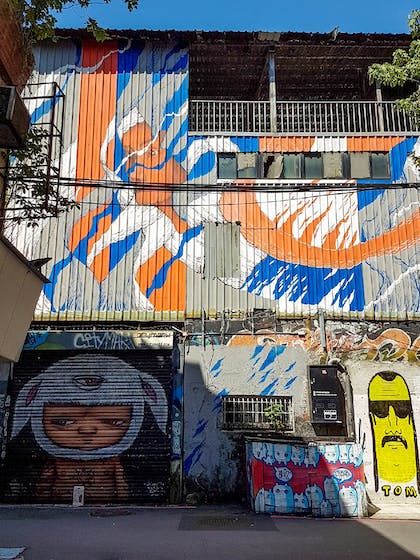
The next day, we explored the street art and were all quite thrilled to discover a piece of graffiti by Thai street artist Alex Face. Lunch was a treat by the Tourism and Travel Department, New Taipei City Government, hosted on the 48th floor of the Moon Pavilion overlooking magnificent views of the city. This is where I learned that Taipei City and New Taipei City are governed by separate administrations: Taipei City being an egg in the middle with the New Taipei City wrapping around it, its metropolis covering nearly 6% of the whole country. During lunch, we were treated to the famous Thai tea, Cha Tra Mue, which was nice.
We spent the first sunny afternoon at The National Chiang Kai-shek Memorial Hall, where our guide pointed to a large map of China behind a replica of the general’s desk, “You can see from the map that even being in Taiwan, his heart was always in China,” said our guide, as he continued to unspin the little knowledge we had about China and Taiwan.
“Taiwan was founded by Portuguese sailors who were so impressed by the beauty of this island they called it Formosa which means Beautiful Isles in Portuguese,” said Saimon, our guide, taking us back to the 16th century. “Then, a century later this island was colonised by the Dutch, then the Spanish and later China during the Qing dynasty. Taiwan was also ceded briefly to Japan in 1895 and finally with support from the US, Chiang Kai-shek was able to reclaim Taiwan at the end of World War II,” going on to explain the complexities of Taiwan’s current status.
“During the Japanese occupation in the late 19th century, our great grandparents had to change their last names to Japanese,” said Saimon, who described the relationship between Taiwan and Japan as fairly friendly. “My grandparents can speak Japanese fluently,” said Judy Tang of Tripool, a wallet friendly car service, who took care of us for the whole trip, “The reason why we like the Japanese so much is because when they governed us they built factories and facilities for us such as our highways, all we did was continue their work.”
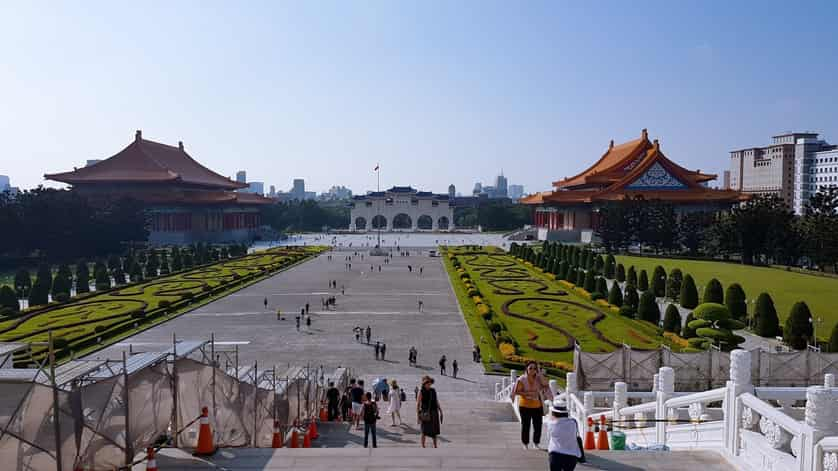
After the end of World War II, the Chinese Civil War resumed and Chiang was defeated by Mao Zedong. He retreated to Taiwan where he spent his years planning to reclaim China. Most of us, I am ashamed to say, knew next to nothing about Taiwan and were shocked to learn about their feelings about China, spotting several small protest groups at various tourist spots, holding anti-Chinese placards. “It’s things like limiting flights to Taiwan and controlling the Chinese tourists who come here,” Judy explained. The point was hammered home when we saw an image of HM our late King Rama IX with Chiang Kai-shek, an image banned in Thailand because of our cosy relationship with China. We were surprised to learn that there is no official Thai Consulate Office in Taiwan, just an Economic and Trade Office. “It’s my generation and above who really despise China, but the younger generation, they are ore open because China promises job opportunities,” explained Judy who was only in her 30s.
Knowing what Thai media liked, the organisers treated us with nightly visits to various markets, which we learned were always built around temples, as people would gather to pray as well as to socialise and shop, we Thais nodding sagely in full agreement and understanding. We had a good time at Shilin night market which had a temple fair vibe, complete with balloon darts (at 100 baht a round!), mahjong tables and street vendors and the Raohe Night Market in Taipei City, which was all about food, with intriguing delicacies, I must admit to not being fully sold on, all with long queues backing up from most vendors.
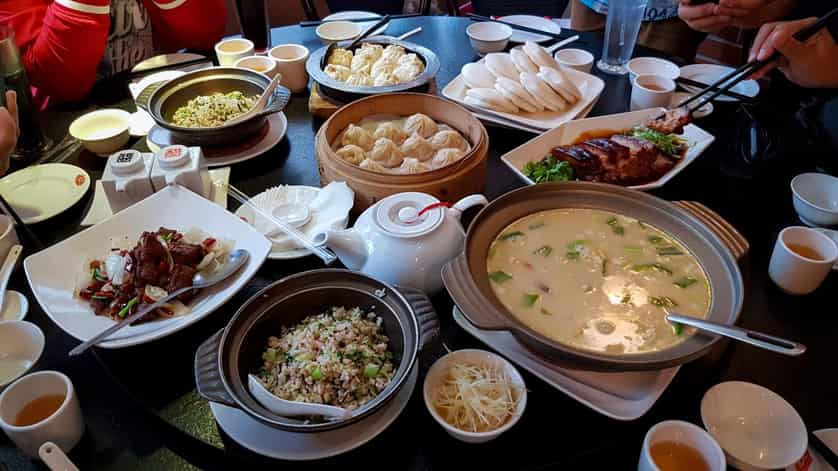
On the third day after having made the brutal hike up the Xiangshan Trail to see views of Taipei City, my feet were screaming for a rest, but blood and pain never stop a Thai from good food, so that night we had to trek to find a shabu shop whose owner greeted us warmly, telling us he loved Thailand, and fed us to our great satisfaction.
We spent our last day out of the city visiting the eerie Yehliu Geopark, known for its mushroom looking rocks, eroded by wind and water over time, and quite a spectacular site. Our last stop was the Jiufen Old Street, a small village full of old-world charm. “There used to be a gold mine here,” explained Judy, while we were huffing and panting up the steep village steps, “gold was found downstream in the late 19th century so people tracked the river up to here, settling here until after the war when the gold ran out and the village was mostly abandoned”. In 1989, an award-winning and world-renowned film by Hou Hsiao-hsien, titled A City of Sadness, brought fresh attention to the village, but Judy smiled and said, “I’ve never seen the film, it’s too old,” referring instead to the popular 2001 Japanese anime, Spirited Away, which also helped drive tourism to what is now a thriving destination where people come to wander its tiny streets and enjoy the vintage old shops.
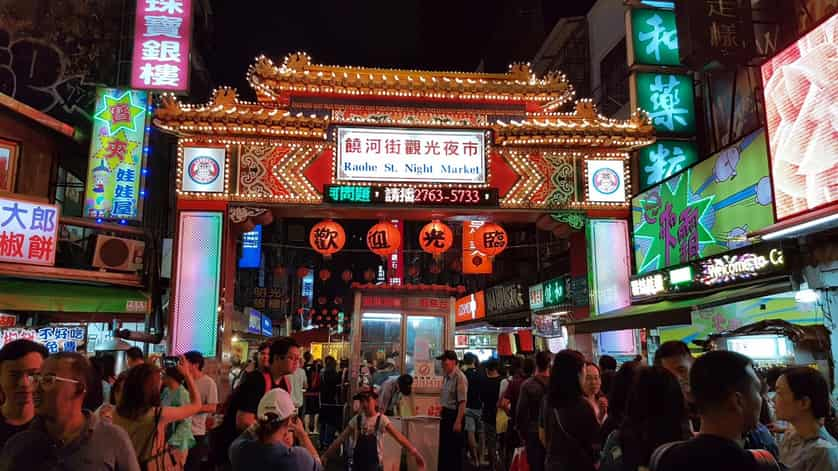
Our day of culture continued as we visited Houtong, another old mining town, today known for its cats. Not being a cat lover, I left my fellow media friends to coo and chase after kittens, instead heading to a small museum featuring a replica of the old mine where I learnt about all the hazards of mining and the large death toll.
Four days passed by quickly, and like a typical fun vacation, I was sulking at the thought of going back to work. It might be the adrenalin rush of my first time in Taiwan, but the city is the image of what I imagine my hometown of Chiang Mai could be; clean and vibrant with street food and nightlife while also being safe, a city where art and technology coexist and nature is only an hour’s drive away. Public transportation is convenient, reaching out all the way to the rural areas. Food is varied and start at around one hundred baht per dish. Although I did not get a chance to spend much time in the countryside, from talking to our guides, I got the feeling that it was a friendly and warm country with beautiful nature. I am really eager to explore more of this country the next time I am in Taiwan. There is so much I did not know but I have a sense that Taiwan could easily feel like home to me.
A direct flight between Chiang Mai and Taiwan is available at AirAsia on Tuesday, Wednesday, Friday and Sunday. For more information please visit www.airasia.com.
